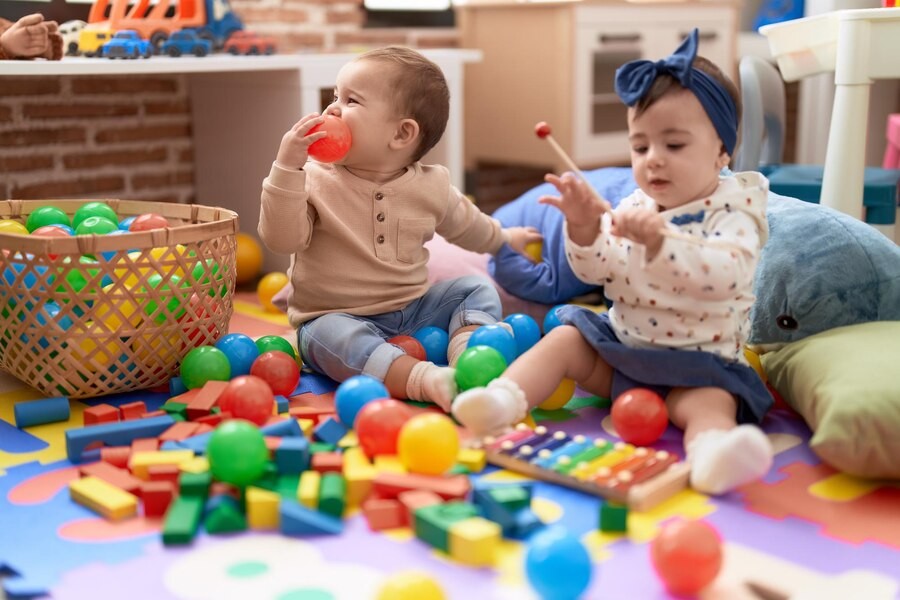ADHD (Attention Deficit Hyperactivity Disorder) adalah gangguan perkembangan yang memengaruhi kemampuan seseorang untuk fokus, mengendalikan impuls, dan mempertahankan aktivitas yang sesuai. Gangguan ini biasanya terdiagnosis pada masa kanak-kanak, dan dapat bertahan hingga dewasa.
Penyebab pasti ADHD belum sepenuhnya dipahami. Walaupun ADHD cenderung diturunkan dalam keluarga (faktor genetik), namun faktor lain mungkin turut menjadi penyebabnya.
Benarkah Terlalu Banyak Stimulus Menyebabkan ADHD?
Di era modern, banyak bayi terpapar berbagai stimulus, mulai dari gadget, televisi, mainan interaktif, hingga suara keras di sekitar mereka. "Stimulus berlebih" mengacu pada paparan bayi terhadap rangsangan yang terlalu intens, baik secara visual, auditori, maupun fisik.
Contohnya termasuk penggunaan gadget seperti tablet atau smartphone dalam waktu lama, suara bising yang berlebihan, televisi yang terus menyala, serta mainan yang dilengkapi dengan cahaya dan suara yang terus-menerus menarik perhatian.
Banyak orang tua bertanya-tanya apakah paparan stimulus yang berlebihan dapat berkontribusi terhadap perkembangan ADHD. Meskipun penelitian tentang hubungan ini masih berlangsung, beberapa studi menunjukkan bahwa paparan yang berlebihan terhadap rangsangan, terutama pada usia dini, dapat memengaruhi perkembangan perhatian dan kontrol impuls.
Namun, penting untuk diketahui bahwa ADHD dapat dipengaruhi oleh berbagai faktor, termasuk faktor genetik dan lingkungan. Oleh karena itu, meskipun stimulus berlebihan turut berkontribusi, namun hal ini bukan menjadi satu-satunya faktor penyebab terjadinya ADHD.
Baca Juga: 5 Strategi Jitu untuk Mengelola Gejala ADHD Anak
Banyak ahli berpendapat bahwa paparan stimulus dan penggunaan perangkat elektronik yang berlebihan dapat memicu gejala yang menyerupai ADHD. Hal ini juga dapat memperburuk gejala pada anak-anak yang sudah rentan terhadap ADHD.
Dampak negatif dari penggunaan perangkat elektronik dan stimulus berlebihan pada perkembangan perhatian anak antara lain:
- Penurunan kualitas tidur: Paparan layar sebelum tidur dapat mengganggu pola tidur yang sehat.
- Kesulitan fokus di sekolah: Anak-anak mungkin mengalami kesulitan berkonsentrasi, terutama pada tugas yang memerlukan perhatian tinggi.
- Pengaruh pada keterampilan sosial: Interaksi yang berkurang dengan teman sebaya dapat menghambat perkembangan keterampilan sosial anak.
Tips Mengelola Stimulus pada Bayi
Meskipun terlalu banyak stimulus bukanlah penyebab langsung terjadinya ADHD, mengelola paparan stimulus dengan baik sangat disarankan untuk mendukung perkembangan yang sehat hingga dewasa.
Berikut beberapa tips untuk mengelola stimulus pada bayi:
- Batasi waktu penggunaan gadget atau televisi: Khususnya untuk anak di bawah 2 tahun, batasi durasi penggunaannya.
- Pilih mainan yang merangsang kognisi: Gunakan mainan yang mendukung perkembangan, seperti mainan tanpa suara atau cahaya berlebihan.
- Interaksi langsung: Ajak bayi lebih sering berkomunikasi melalui obrolan, nyanyian, atau permainan sederhana.
- Kurangi suara bising: Ciptakan lingkungan yang tenang dan pastikan bayi memiliki waktu yang cukup untuk beristirahat.
Terlalu banyak paparan stimulus pada bayi memang tidak langsung menyebabkan ADHD, tetapi gadget dan suara bising yang berlebihan dapat memengaruhi kemampuan fokus dan perilaku anak. Oleh karena itu, penting bagi orang tua untuk menciptakan keseimbangan lingkungan dan memberikan stimulus yang sesuai dengan tahapan perkembangan bayi.
Jika ada pertanyaan lebih lanjut, Anda dapat berkonsultasi dengan dokter melalui aplikasi Ai Care yang dapat diunduh di App Store atau Play Store.
Mau tahu informasi seputar kehamilan, menyusui, kesehatan wanita dan anak-anak? Cek di sini, ya!
- dr Nadia Opmalina
Hope Gilette (2021). The Link Between ADHD and Overstimulation. Available from: https://psychcentral.com/adhd/the-link-between-adhd-and-overstimulation
Cleveland Clinic (2023). Does Heightened Screen Time Cause Attention-Deficit Disorder (ADHD) In Children?. Available from: https://health.clevelandclinic.org/screen-time-and-adhd
Angela Mae (2023). What to know about ADHD and sensory overload. Available from: https://www.medicalnewstoday.com/articles/adhd-sensory-overload
American Psychiatric Association (2022). What is ADHD?. Available from: https://www.psychiatry.org/patients-families/adhd/what-is-adhd
Lisa Guthrie (2023). ADHD Symptoms in Children. Available from: https://www.webmd.com/add-adhd/childhood-adhd/adhd-symptoms












